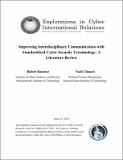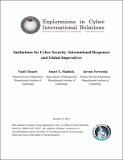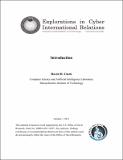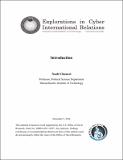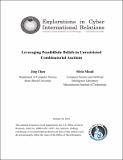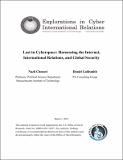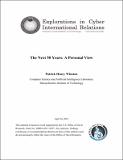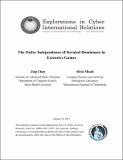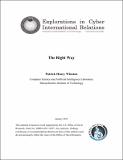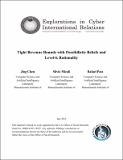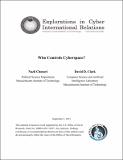Browsing Articles & Book Chapters by Title
Now showing items 9-19 of 19
-
Improving interdisciplinary communication with standardized cyber security terminology: A literature review
(© IEEE, 2016-03-21)The growing demand for computer security, and the cyberization trend, are hallmarks of the 21st century. The rise in cyber-crime, digital currency, and e-governance has been well met by a corresponding recent jump in ... -
Institutions for cyber security: International responses and global imperatives
(© Informa UK Limited (trading as Taylor & Francis Group), 2013-10-22)Almost everyone recognizes the salience of cyberspace as a fact of daily life. Given its ubiquity, scale, and scope, cyberspace has become a fundamental feature of the world we live in and has created a new reality for ... -
Introduction
(MIT Press / © David D. Clark, 2011-10-01) -
Introduction
(H-Diplo | ISSF Roundtable Reviews/© Nazli Choucri, 2016-12-05) -
Leveraging possibilistic beliefs in unrestricted combinatorial auctions
(MDPI AG/© Jing Chen, & Silvio Micali, 2016-10-26)In unrestricted combinatorial auctions, we put forward a mechanism that guarantees a meaningful revenue benchmark based on the possibilistic beliefs that the players have about each other’s valuations. In essence, the ... -
Lost in cyberspace: Harnessing the Internet, international relations, and global security
(Sage Journals/© 2012 Nazli Choucri, & Daniel Goldsmith, 2012-03-01)Early in the twenty-first century, new, cyber-based threats to the well-being of individuals, economies, and societies added a new dimension to the well-understood threats of the twentieth century. For the first time in ... -
The next 50 years: A personal view
(© Elsevier B.V., 2012-04-24)I review history, starting with Turing’s seminal paper, reaching back ultimately to when our species started to outperform other primates, searching for the questions that will help us develop a computational account of ... -
The order independence of iterated dominance in extensive games
(John Wiley & Sons, Inc./© Jing Chen, & Silvio Micali, 2013-01-22)Shimoji and Watson (1998) prove that a strategy of an extensive game is rationalizable in the sense of Pearce if and only if it survives the maximal elimination of conditionally dominated strategies. Briefly, this process ... -
The right way
(© Cognitive Systems Foundation, 2012-01)I ask why humans are smarter than other primates, and I hypothesize that an important part of the answer lies in the Inner Language Hypothesis, a prerequisite to what I call the Strong Story Hypothesis, which holds that ... -
Tight revenue bounds with possibilistic beliefs and level-k rationality
(© The Econometric Society, 2015-07)Mechanism design enables a social planner to obtain a desired outcome by leveraging the players’ rationality and their beliefs. It is thus a fundamental, but yet unproven, intuition that the higher the level of rationality ... -
Who controls cyberspace?
(Sage Journals/© Nazli Choucri, & David D. Clark, 2013-09-01)When Wikileaks released hundreds of thousands of Iraq War logs and diplomatic cables in 2010, a horrified US government sprang into action—but the classified information the government hoped to keep from public view quickly ...
